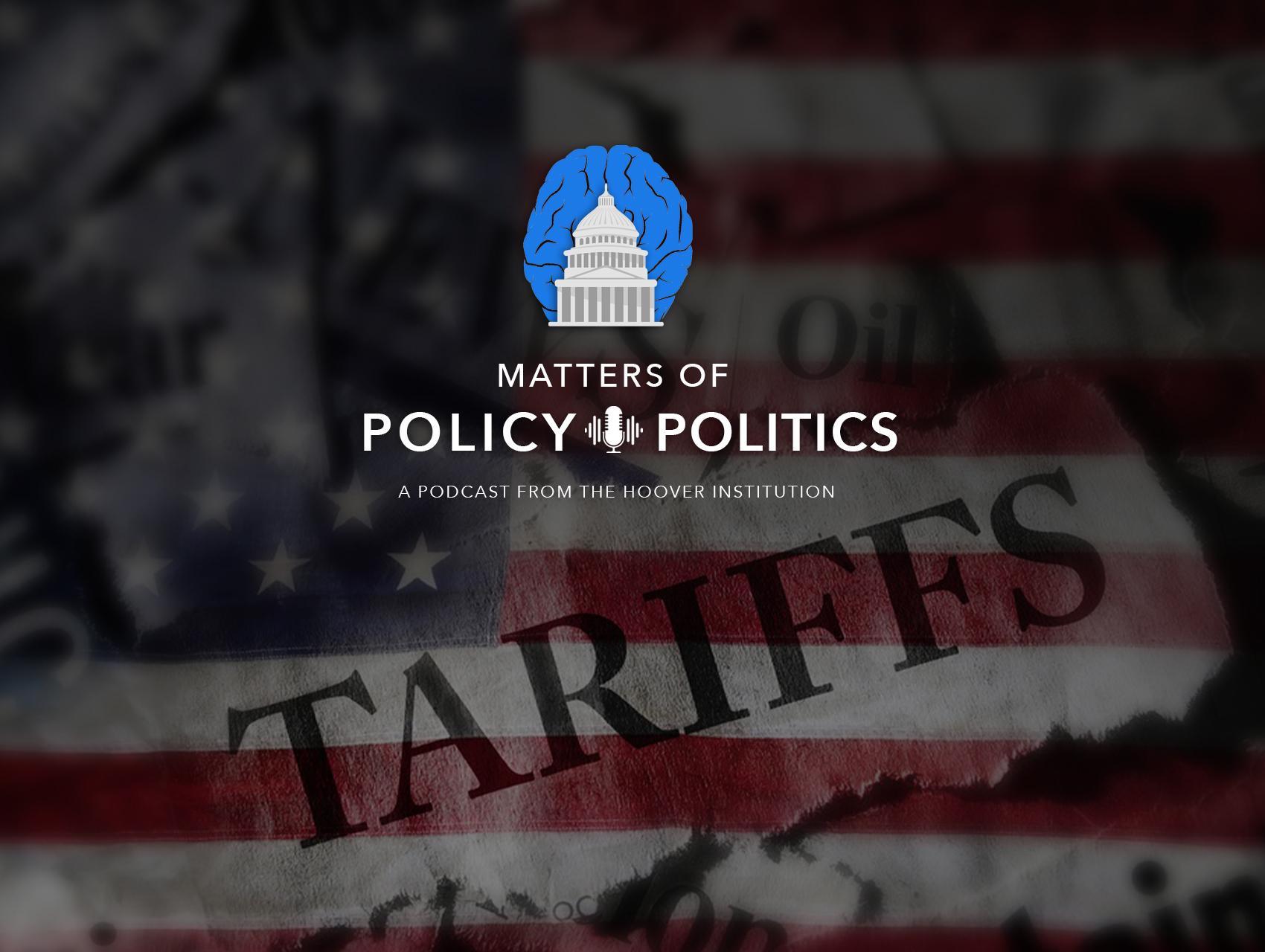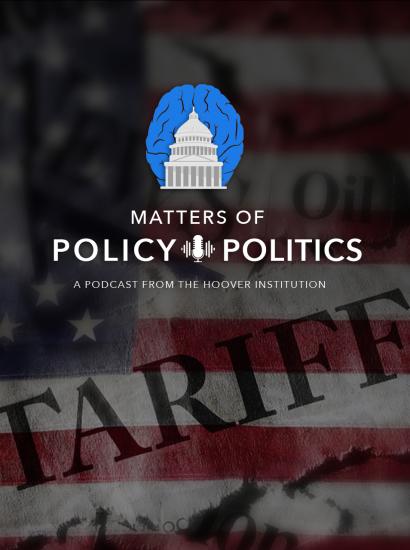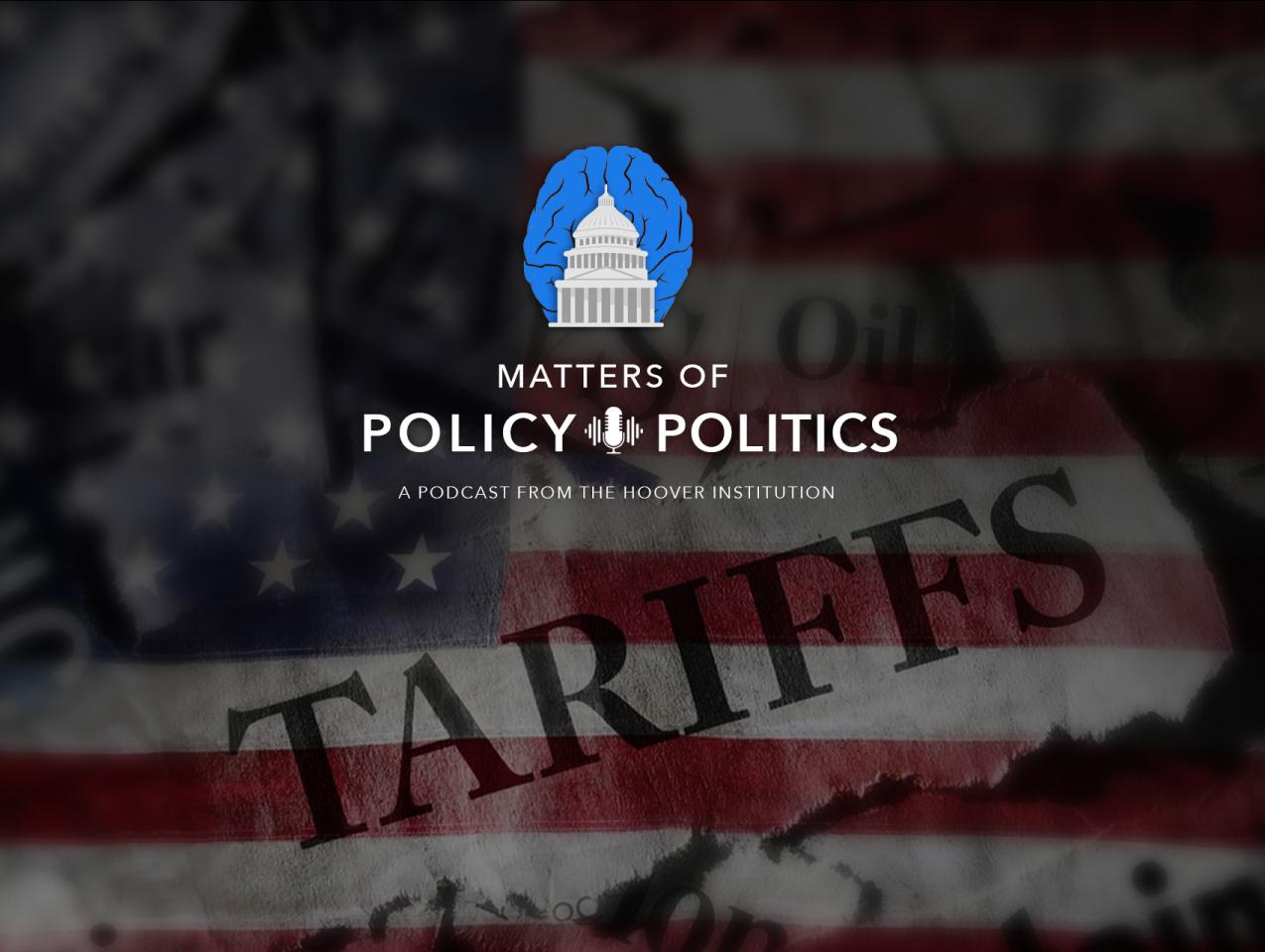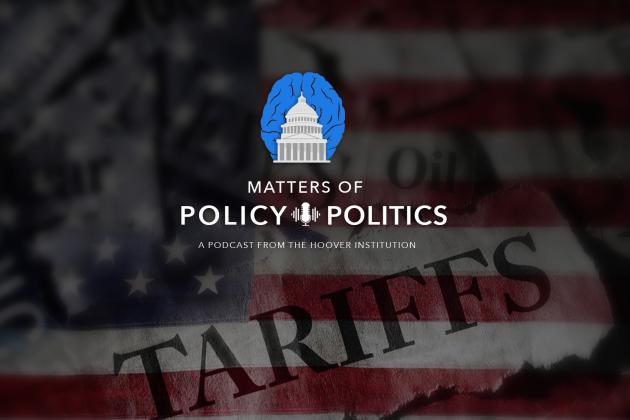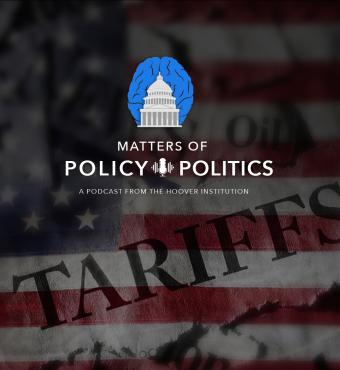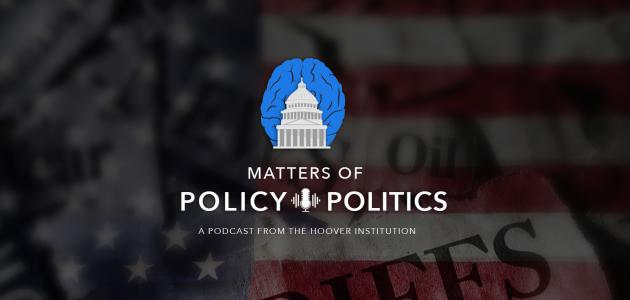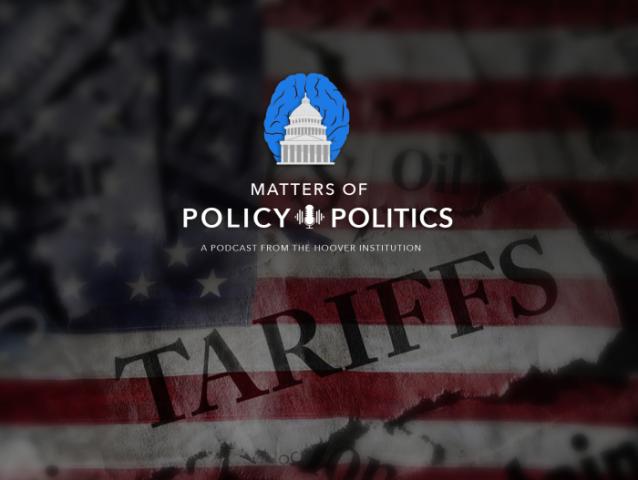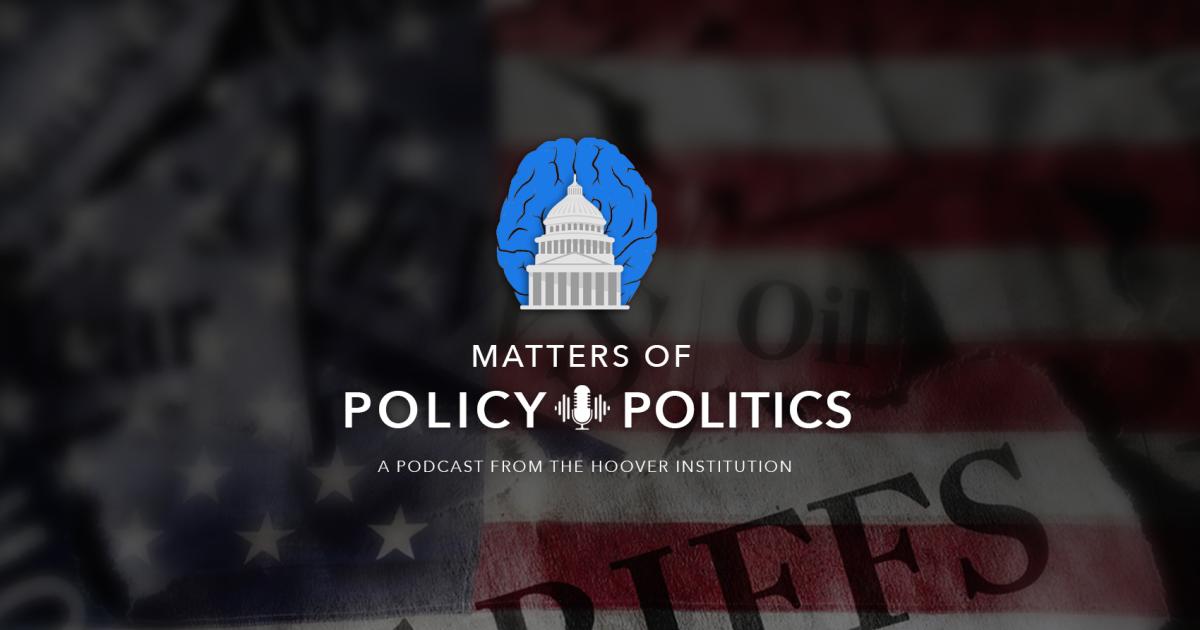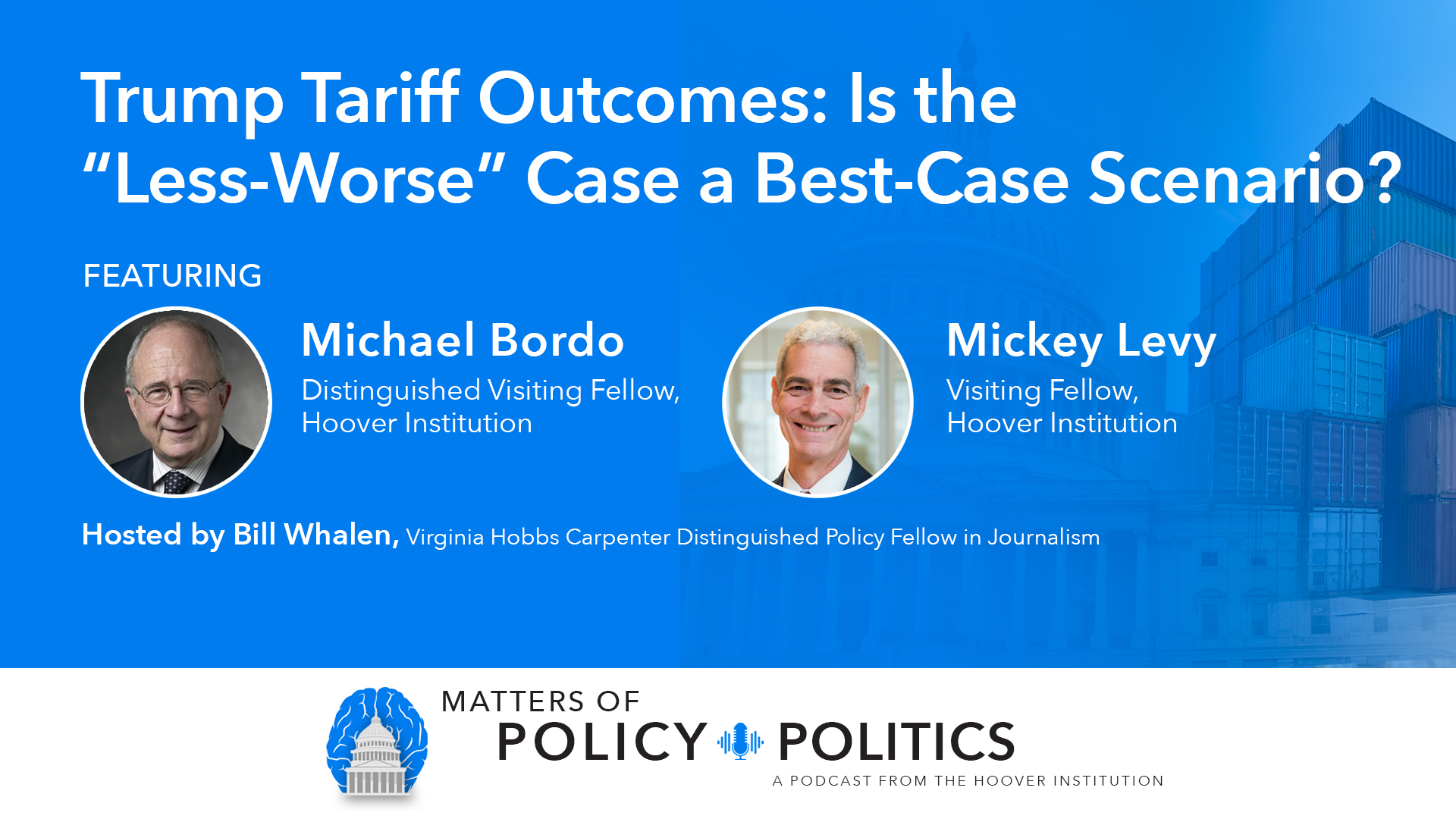- Trade
- The Presidency
- Answering Challenges to Advanced Economies
What’s the most likely outcome for President Trump’s tariff strategy – trading partners capitulating, America’s economy and exceptionalism crumbling, or something in the middle?
Hoover fellows and economists Michael Bordo and Mickey Levy discuss a recent paper they’ve published on the history of tariff impositions and four possible outcomes (none of them are good). Their conclusion: the odds favor a “less-worse” case of 12%-14% tariffs and deals with Canada and Mexico, with a “small but cumulative impact” on longer-run potential growth (maybe a mild recession) while the U.S. retains its global dominant status.
Recorded on June 6, 2025.
WATCH TO THE EPISODE
>> Bill Whalen: It's Friday, June 6, 2025. And welcome back to Matters of Policy and Politics, a Hoover Institution podcast devoted to the governance and balance of power here in America and around the World. I'm Bill Whalen. I'm the Virginia Hobbs Carpenter Distinguished Policy Fellow in Journalism here at the Hoover Institution.
I'm just one of many Hoover fellows who are podcasting. And just don't take my word for it. Check it out yourself. Go to our website, which is hoover.org/podcast, and you'll see what all we're talking about these days. Today, we're going to talk about something that is very much on radar of this institution and that is the thorny topic that is tariffs.
If you go to the Hoover website and see what Hoover fellows are talking about these days, you will come across a piece by Philip Zelikow. Philip's a Hoover Senior Fellow and presidential scholar, and he's looked at President Trump's actions in relation to the use of presidential emergency powers.
You'll also find a very excellent New York Times op ed by Michael McConnell, who's also a Hoover Institution Senior Fellow. He's a Stanford law professor. He's one of the nation's foremost authorities on constitutional law, and he wrote an essay discussing tariffs in the context of the presidents of both parties in the seizure of unilateral powers.
So we're going to talk about tariffs today, but in a different fashion. We're going to talk about the economics of the matter and possible outcomes. We're gonnaweigh the odds and possibilities of what might happen. And joining us today are a pair of Hoover economists. Michael Bordo is the Hoover Institution's Ilene and Morton Harris Distinguished Visiting Fellow, as well as a Board of Governors professor of Economics and director of the Center for Monetary and Financial History at Rutgers University.
Mickey Levy is a Hoover Institution Visiting Fellow, and he also manages a private economic and consulting firm. You might also remember Mickey from a past podcast we did, talking about that devil called inflation. Gentlemen, good to see you today. Thanks for coming on the podcast. So let's get into the matter.
Before we get into terrorists itself, I'd like to run four news items at you things that are in the news this week. And I want you to tell people who are concerned about economics, concerned about tariffs, which of these stories they should be paying most attention to. Item number one, it's hot news because today is Friday.
Earlier today, the news out the May jobs report, and I believe they came out 139,000 jobs in America in May. If I'm not Mistaken. The good news is that beat expectations. The bad news, though, that was less than April unemployment holding steady at 4.2%. So that's item Number 1, the May jobs report.
Item number two, Mickey, Michael, report earlier this week that goods brought into the US plunged by 20% in April, recording their largest ever monthly drop. US purchases from China and Canada fell to the lowest level since 2020 and 2021, respectively, the Commerce Department said. Item number three, the Trump administration doubling tariffs on aluminum steel to 50%.
We'll have to wait and see what that does to automobile prices. Finally, item number four, an analysis released earlier this week by the Congressional Budget Office claiming that the Trump tariff plan will cut the deficit by $2.8 trillion over a decade. Good news, except that it will also shrink the economy, in the CBO's estimation, and increase the annual inflation rate by 0.4% in 2025 and 2026.
So, Michael, Mickey, I've given you four news items there. Which one stands out?
>> Mickey Levy: Well, I think you have to put all of them into the framework that Mike and I have been studying, and that is the historic context. And what we found uniformly is tariffs are a negative for the US economy and global growth.
And each of these four items just highlights the focus of the issue of tariffs. And let me add a fourth item lurking in the background that you haven't mentioned, Bill, and that is President Trump's erratic tariff policies that have added a tremendous amount of uncertainty that seems to be affecting labor markets and consumer and business behavior.
So
>> Bill Whalen: back up a second, Mickey, when you say erratic policies, are you talking about just randomly applying numbers to different tariffs in different countries or.
>> Mickey Levy: Right, and his applying tariffs. And then when facing a pain threshold, say the stock market goes down and the dollar falls, he shifts gears, and it just adds this tremendous amount of uncertainty.
So the broader context for thinking about all these current events, like the plummeting imports, like the jobs report, that shows a marked deceleration in job increases, and then Trump doubling up on these tariffs. The broader context is President Trump seems to be ignoring the critically important lessons of history, that tariffs have negative economic effects and, and never accomplish their objectives.
So that's my, that's my broader statement.
>> Bill Whalen: Michael, let's talk a bit about the historic lessons. So what fascinates me here, it doesn't get enough coverage, but you guys did a really great job in your, in your column. If I had tasked you to a couple of decades ago to look at the United States involvement in Afghanistan, let's say we're about to invade after 9 11.
You, as two military historians, military experts, you would have sat down, you looked at the history of Afghanistan. You looked at what the Soviets went through in the 1970s and 80s. You looked at what the British went through in the 19th century, and you would apply that to possible outcomes for the United States invading Afghanistan.
So, Michael, explain a bit about how you and Mickey researched terrorists and what you looked at in terms of historical analogies, historical events.
>> Michael Bordo: Right. So I'm an economic historian. I've been teaching a course on globalization, historical perspective for 20 years. I ran along with two others, an MBR big conference we had 20 years ago on globalization, which, where we were thinking exactly about the benefits of globalization, so with this context, I just viewed this, the spate of tariffs that are being imposed as an extremely terrible thing.
Terrible. And I look at history and I can give you two, two examples that will just illustrate this. The first one, which a lot of people talk about, is what happened in the Great Depression, okay, In the Great Depression, in 19. In 1930, the US passed a smoot Hawley tariff, which raised tariff rates to 20% above 20%, which is just a little bit where they are right now.
And what happened after that was that Canada first and then a whole lot of other countries retaliated. And so what happened was that, in a sense, international trade totally collapsed. And along with international trade goes capital flows and also immigration. Both of these things just collapsed in the 1930s.
And in fact, what happened in the 1930s was the end of what was called the first era of globalization, which was a really important event. This was something that started in the UK and in England in the 1840s when they started reducing tariffs because everybody had high tariffs back then.
And they passed something called a repeal of the corn laws. The corn laws were taxes on wheat. And so when the British did that, okay, that really had a big effect on the British economy. And the second thing they did is they worked out a trade treaty with France called the Cobden Chevalier Treaty.
This is in 1860. And basically it created something called the most favored nation approach to tariffs, which is, if we will lower tariffs with you, the French, and the French will lower towers with us, we'll have reciprocal tariffs, and then everybody else that trades with us will get the same deal that England and France got.
And so what this did was it really reduced tariff protection in Europe and then it spread to other countries. And this helped encourage a tremendous growth in trade. And the growth of ratio of trade to GDP took off, okay? That was helped by technological change and shipping in railroads and everything else.
So you had this tremendous boom that starts back then and it flows around the world, it's associated with the global growth. And along with that, we had capital flows, okay? We had a tremendous amount of capital flowing from Europe to the new countries of new settlement, and we had migration.
So this was the first year of globalization, okay? And it ended with the terrible events I told you about for. Actually, it started even earlier. It started with a restriction on immigration at the turn of the last 20th century, because once all these immigrants came in, there was a big backlash from organized labor in this country and other countries.
It also led to tariffs, which started even before Smoot Hawley. US Was always a high protection country. And they raised tariffs after World War I, the famous tariff called Fordney McCumber Tariff. So in a sense, this reversed the globalization, okay? And then of course, what happened is this led to the Great depression, World War II, and the belief that came out from the Roosevelt administration and Cordell Hull especially that restoring trade would be associated with peace.
And there was a view that there was a correlation between the total breakdown of trade in the 1930s and World War II. And so then we founded. The US was really important in founding these institutions to restore global prosperity, global trade, and eventually global capital flows, okay? And this is the gatt.
This is the imf, okay? The World Bank. All these institutions were founded right after World War II. And they led to a tremendous growth in trade, in capital flows later. And migration came back. And so we had a second year of globalization, okay, which kind of peaked with the gfc, okay, but is coming back.
And now it's being threatened, being threatened by the same forces that destroyed the first year of globalization back in the.
>> Bill Whalen: 1930s when Smoot Hawley is put into place. Was the strategy the same then? Michael, it is now. The strategy now is what, you impose tariffs and countries will come to you on their knees begging for a better trade deal.
>> Michael Bordo: No, it was a different environment, okay? Back then, it was the Congress that passed this Mood Hawley tariff, okay? And it was not coming from the executive. And the reason they did this was because the depression was already starting and agricultural prices were falling. And so the agricultural interests, which are really strong in the US Congress back then, okay?
And they were all the way up until not that many years ago, okay, they convinced them to push on a tariff. But you have this phenomenon in US Politics called log rolling, whereby Congress, people from other districts that weren't agriculture said, look, I'll support you if you support tariffs on manufacturing.
So what happened was a simple bill that was just going to help farmers ended up being a tariff on everything, okay? And there was no talking about dealing with other countries, none of that stuff. It wasn't strategic. It was protection, pure and simple.
>> Bill Whalen: We do have a lot rolling these days, Mickey, it's called the Big Beautiful Bill.
>> Mickey Levy: Yeah, so, hey, Bill, before we go on to fiscal policy, Mike introduces a critically important point here, that President Trump, or Trump's team, is not only ignoring the lessons of history on tariffs and pushing for very high tariffs. But also he's pushing regulations and constraints on immigration.
And if you look at the two heirs of globalization that Mike referred to that were associated with very strong economic growth and progress in the United States, large current account deficits that involve very large capital inflows. And those capital inflows were critically important to financing the capital spending and progress in the United States.
And those two eras were interrupted by constraints on capital and trade, but also immigration. And so right now, among the toxic mixes that we're concerned with is tariffs and also immigration. And we know that Trump's team is taking unfortunate steps to constrain immigration and foreign students being educated at US university, etc., etc.
But this all goes into the mix that, as Mike said, could be challenging this second wave of globalization that has served the US Very, very well economically and every other way.
>> Michael Bordo: All right,
>> Bill Whalen: immigration, Mickey, I assume you're, sorry, Michael, so you said student visas. I assume you're also referencing what visas for software engineers to come in the country.
Can you further
>> Mickey Levy: wait, Bill? Not just that, immigration from our Southern allies. I mean, US Desperately needs immigrants. And I don't think the Trump administration is considering the, not just in the near term, but the longer run costs of of, of constraining those immigrants.
>> Bill Whalen: Okay.
>> Michael Bordo: There's one other issue here which, which is important, and that is that when you look at the arithmetic of trade, right, the current account, which is exports minus imports of goods and services, is equal to net capital flows.
And if you look at the 19th century, the US was in deficit, had, you know, current account deficits, okay? And it was getting tremendous capital flows coming from Europe, which built the railroads and really, you know, globalized. The really blew up our economy, really made our economy take off, okay?
And we've had capital inflows, which right now, in the recent period of globalization, okay, which have financed the growth of high tech and all of the industries that we have a comparative advantage in. So when you shrink the current account deficit, which is what Trump wants to do because he's a mercantilist, he believes that the current account deficits, or even simpler, the balance of trade, should be positive because we want to get more resources from the rest of the world.
So this is mercantilism, which you do that. You reduce capital inflows, which we need. And this is a very serious thing. And then getting back to Mickey's point, look, the growth of the history of the US Was a massive migration from Europe, okay? That, and then from elsewhere.
That was a key part of our growth, okay? And we need immigrants today, okay? Then you get into the issue of human capital. And many of the Trump's policies are going to restrict the growth of human capital, because most of the really smart people that have been innovating in this country in the last 30 years or so come from other countries.
And if you discourage those people from coming, we don't have the talent that's going to substitute for them. This will hurt our potential growth for many decades. This is even worse than, than the tariffs in terms of its potential effect,
>> Bill Whalen: right? So we have a game of chicken going on, if you will, you know, post tariffs, and you assume that the tariffs are going to force countries to come cut deals with you.
I'm curious, as an economic historian, Michael, if there's any kind of analogy, precedent for this. You have, you have a president whose economic strategy is it's flying by the seat of the pants, or maybe more to the point, flying without a compass. You're just trying, you're just guessing what would come down the road with the best case scenario.
Has any president ever approached economics this way?
>> Michael Bordo: Not that I know of. I mean, in the past, as we said before, the tariffs were really coming out of Congress, okay? It was Roosevelt who shifted the, you know, the locust from the Congress to the executive power. And the whole concept of reciprocal tariffs were started in 1935.
But that was designed to reduce tariffs, not to go the other way, okay? So I can't think of anything, but what I can think of is the kinds of things that he's doing are some of the things. And I hate to say this, but this is what Germany did in the 1930s to its neighbors in Europe, okay?
It forced them, it threatened them to sign unfair trade deals okay. And because by the time that, by the time that trade was collapsing in the 1930s, the whole international trade system devolved into something called bilateralism. And when you have a bilateral, each country decides how much they're gonna trade with each other, and what the exchange rate is gonna be, right?
Well, if you're a big nasty country with a big army, you can pressure Hungary, you can pressure all these other Eastern European countries to buy German goods at a very favorable rate in exchange for getting their raw materials cheaper. And that's what the Germans did. Okay, this is, I'm not, I don't want to go that far, but this is what, this is what the kinds of strategies that he's following, I think.
>> Mickey Levy: Hey, Bill, we're talking to each other and, and, and usurping your ability to ask questions. But let's think about Trump's vision of the world and what he would like to see.
>> Bill Whalen: Right.
>> Mickey Levy: And it in and of itself doesn't make sense that he, his vision is, you know, to, to bring manufacturing and manufacturing jobs back home.
Kind of like this idealized 1950s where, where so many people work in, in manufacturing factories. Well, to do so that would involve a huge misallocation of research. We've, of resources. We've moved so far beyond that. And, you know, we're, we're, you know, we've had these advances in productivity.
The US has become an absolute juggernaut in high productivity services exports. And to go back to the 1950s where a large portion of the population or workforce is working in manufacturing just doesn't make any, any sense. And then his other notions about, in the 19th century, you know, tariffs were such a large portion of federal tax receipts.
Well, that was at a time before the income tax system was invented. So it's, it's really quite striking that Trump has said, okay, so we need to impose these tariffs. And there might be some short run costs, but there are long run benefits. And just from using economic common sense and, and a view of history, it's a negative for the longer run.
It reduces potential growth and future growth and improvement in standards of living.
>> Bill Whalen: And Michael, he's making one other calculation to me, which he's guessing that other nations have the same political calculus as the United States. And the last time I checked, Xi Jinping is not term limited.
The last I checked, China does have midterm elections coming up in 2026. So the same political pressures that would apply to the United States with election coming up. My God, tariffs are going to kill imports what about inflation and so forth? It doesn't necessarily apply to the other countries who you want to bring to their knees.
>> Mickey Levy: Well, that's right. And let's consider right now the US's three largest trading partners, Mexico, Canada, and China. And Mexico and Canada are our allies and we want them to do well economically. And both of those countries, about 80% of their exports come to the US, and we want them to do well.
And this, these tariffs assessed on Canada and Mexico are quite negative for them and feeding back negative for us. And then China is our third biggest trading partner and China's domestic economy is really, really suffering and it really needs exports. But, you know, you could ask the question, are there items that we trade with China that do impinge on national security and should be monitored, maybe controlled?
Well, the answer is probably yes. But Trump, in lashing out against China and erecting these very high tariffs, doesn't distinguish between types of goods. So it is kind of just this random strategy that, you know, quite, quite damaging. And then let me just add once again what I mentioned earlier, the uncertainty, imposing a tariff and then threatening to use tariffs as a, as a, as a weapon and then changing a week from now, how are businesses expected to plan and invest for the future?
And how are, how do you expect them to continuing to expand and hire people? And we're starting to see the negatives in the Data in employment, today the revisions to previous months shows that the uncertainties in this environment is definitely having an impact on businesses willing, willingness to hire.
You also see once again in April, the dramatic decline in imports. And if you look at the composition of the decline, most of it's in capital goods and industrial materials. And then you dig in deeper and some of our leading industries are already complaining about the lack of materials they need to produce things.
It just doesn't make sense. And we're, so, we're, we see this, the impacts starting to unfold
>> Michael Bordo: before we. Get to the present. I just wanted to inject one other historical note, and that is that there were countries that went the other route, that countries that decided the way they could grow in industrial is by creating a tariff wall.
And this is what happened in Latin America in the 1930s. And the brains behind this was a guy named Raoul Preby in Argentina. And what happened is all the countries in Latin America listened to him. They imposed huge tariff walls to build up domestic industry, okay, Domestic manufacturing.
And of course, what tariffs do. One of the things we didn't mention is it creates rent seeking. Because once you got the tariffs, the industries that have them are going to be very reluctant to get rid of them. So even if you use what's called the infant industry argument and you say, okay, now we're going to grow up and then once we've gotten big enough, we've got economies of scale we can roll back, what happens is the rent seeking take takes over the political and the tariffs don't come down and you end up with Argentina, which went from being a rich country in 1900 to becoming emerging, a poor emerging country 10 years ago.
Okay? And the same thing with India, Nehru, that was his strategy when they got independence from the British. We're gonna build a steel industry, we're gonna build cars. And they had incredible tariffs. They had quotas, capital controls, exchange controls, okay? And the country stagnated until the 1990s. So in a sense, there's so much looking at other countries, looking at shocks like the Great Depression.
All of them come up with the same answer, which is tariffs are a bad deal.
>> Bill Whalen: All right, we've talked about the present and we've looked at the past. Let us now talk about the present, but let's look at the future. So it's time to pull out your crystal balls.
And here I turn to your defining ideas column. Defining ideas for those not familiar with it as a web channel at the Hoover Institution website. The title of this column is Tariffs and Disregarded Lessons. And you came up with 1, 2, 3, 4 possible outcomes here. And the first thing that stands out, gentlemen, is there is not a fifth outcome, which is sunshine, rainbows, lollipops, everything wonderful happens.
You just couldn't go there, could you?
>> Mickey Levy: Well, so Bill, we, Mike and I spoke about this, and what led us to think about toward this scenario analysis is Trump's erratic behavior. So what we saw in, in March and then early April, where he's putting on high tariffs, that was when there was a steep stock market correction, right?
And Trump, the stock market went down at the same time the dollar was falling sharply. And that those declines obviously went beyond some kind of pain threshold that Trump had, and he backed off. And then at the same time, when he was tripling up on tariffs on China, Apple CEO Tim Cook made a call into Trump and said, this is going to drive up the prices of iPhones dramatically.
And Trump then excused from tariffs over $100 billion worth of, you know, iPhones and peripheral items. So we, we see this pattern where Trump is a negotiator and he's, he backs off when hits pain thresholds. He, he loves to negotiate. He loves it when E Leaders or, you know, US CEOs come and kiss his ring.
And so based on that, we developed these, these scenarios and they were developed at a time when the average effective tariff that Trump had originally imposed is about 25%, which was higher than the Smoot Hawley of, of, of 1930. And so we came up with these scenarios and they, and they run the gamut from-
>> Bill Whalen: I'm gonna read each one to you guys, and then I want you to explain how you got up with it. So here we go. You have four of them. And let's do these in the order of least probable building up to the final one, which you think is the most probable scenario.
So the least probable scenario, you give it a 5% chance of happening. You call it the worst, worst case. And let me just read what you wrote. Effective average tariffs of 25%. Trade war with China escalates. Current tariffs on Canada and Mexico persist. Trump ramps up deportation of immigrants, makes permanent cuts in government funding and research in universities.
US Credibility diminishes, reducing value of dollar, isolating US economically and diplomatically stock market falls sharply. Deep recession and potential growth diminished by 0.5%. US exceptionalism arose decidedly. Yikes,
>> Mickey Levy: ouch.
>> Bill Whalen: But only a 5% chance of that happening.
>> Mickey Levy: Yes, and the reason why we only put a low probability on that is we have seen Trump respond to pain thresholds and negotiations.
Note, Bill, that that we call the worst worst case. The worst case, which is scenario three, has high tariffs. The hype or high probability case is the less worse case.
>> Bill Whalen: And we'll get to those in a minute. But I want to work these up in order of.
>> Mickey Levy: Yeah,
>> Michael Bordo: okay,
>> Mickey Levy: yes, but, but in every one. Note that in every one of our scenarios, they have. All of them have negative outcomes,
>> Bill Whalen: right? There's pain no matter what. It's just a question of.
>> Mickey Levy: Because. Because tariffs, historically, tariffs are bad.
>> Bill Whalen: Okay, so, Michael, the worst worst case, 5%.
We just did. Now, that takes us up to a probability of 10%. Michael, best outcome, mild negative. And here's how you Describe mild, negative. 10% Average effective tariffs on all imports with select exceptions. Negotiations reduce trade barriers. Uncertainties are moderate. Significant US Slowdown or very mild recession. Dollar and stock market remain firm and treasury yields declined.
Michael, only a 10% chance of that happening.
>> Michael Bordo: Right, no, yeah, we don't think that that's gonna happen. We think that the most likely case is scenario two, okay, where tariffs are going to settle around 15%, maybe 12 to 14%.
>> Bill Whalen: We'll get to that. We'll get that finally.
>> Michael Bordo: But we think this one, there are too many missteps that have already been taken, and we think it'd be very hard to roll all of that back.
>> Bill Whalen: nOkay, Mickey, your third scenario, you call it worst case, not worst, but worse with an E, worst case. And you give this a 15% probability and it goes as follows.
20% average effective tariffs, including 10% on all imports. Easing of current tariffs on China, Canada and Mexico. Fall in US dollar results and spike in US treasury yields. Forced Federal Reserve intervention to stabilize markets. Sizable stock market declines, moderately. Deep recession with sizable hits to business investment and housing activity.
Sizable negative impact on US Potential.
>> Mickey Levy: Okay,
>> Bill Whalen: that sounds like a lot of small heart attacks.
>> Mickey Levy: That worst case scenario that we put 15% on.
>> Bill Whalen: Yes.
>> Mickey Levy: Note that we say, you know, it involves 20% effective tariffs.
>> Bill Whalen: Right.
>> Mickey Levy: We started out with the beginning of Trump and it was 25%.
Before that they had been like 3%. Okay. Currently with the givebacks, currently you could say they're about 18. So it would be keeping all the tariffs on board right now. But what we add to this worst case scenario is as you stated, the US Dollar continues to fall and treasury yields spike and force Fed intervention in the market.
And here, as we discuss in the paper, if you think about the Fed is given this dual mandate of 2% inflation and maximum employment. And the tariffs are on a collision course with that. They're going to hit the economy, cause recession, push up the unemployment rate. At the same time, at minimum, it adds, it adds to, you know, at least a temporary rise in inflation.
So what we're describing in this scenario is real problems. That is right now a touch over 30% of all U. S. Treasury publicly held debt is held by foreigners.
>> Bill Whalen: Right.
>> Mickey Levy: And the dollar falls, you know, and, and it's not just the dollar following, but, but Trump's, you know, really belligerent behavior toward our allies.
Global portfolio managers, including some foreign central banks, could decide to reduce their holdings of US treasuries. At the same time, the Fed is trying to reduce its holdings of Treasuries and at the same time deficits are going up. It's just a collision course. And so this scenario three and scenario four, you know, address the possibility of these, you know, this toxic mix heading south.
And Bill, this is, this is on the minds of people in financial markets.
>> Bill Whalen: Right.
>> Mickey Levy: We don't think it's going to happen. And by the way, the Fed is praying that it doesn't happen. The Fed is looking very carefully at easing some regulations that would allow commercial banks to maybe hold more Treasuries, but it really doesn't have to intervene.
But this scenario is the worse case, it's not the worst-worst case, but it does suggest trouble in financial Markets. And while the markets have been, you know, kind of sanguine the last couple weeks, the market is very aware of these potential risks.
>> Bill Whalen: All right, Michael, now let's take scenario number four.
It's your best case scenario.
>> Mickey Levy: No, that's scenario two.
>> Bill Whalen: Well, this is the less worst case, the best case scenario, but in this case, the less worst case, and you give it a 70% probability. So it is the runaway frontrunner here in terms of likelihood. Less-worse case reads as follows.
As tariffs declined to 12 to 14% average effective rate, including negotiated lower tariffs for Canada and Mexico, diminished retaliation, uncertainties diminished from current levels, distortions to supply chains and production processes result in a marked economic slowdown or mild recession. Fed eases and provides support to stock market dollar declines modestly in an orderly fashion.
US Retains dominant status in world small, but cumulative impact on us longer run potential growth. Michael? 70% probability.
>> Michael Bordo: Yeah, I mean this is the good outcome, okay? This is the outcome that we think is most likely.
>> Mickey Levy: Bill. Okay, so how do we get that? We get to that scenario because we know that Trump loves to negotiate and we know that he has this tendency to back off when things get bad.
So what we see, for example, in employment, employment's going to weak, is very likely to weaken some more. And Trump, his initial reaction was to lash out at the Fed this morning, but his next reaction will be to back off of certain tariffs. From an international perspective, China's domestic demand is exceedingly weak.
China desperately needs to increase exports, particularly its high tech exports to the US it's very open to negotiating. Europe is also weak and wants to negotiate. Very likely we'll see negotiations between US And Canada and then the US And Mexico proceed. And so Mike and I think the highest probability outcome is, you know, we end out with, you know, average tariffs of 12 to 14%.
Those are, those are three times higher than what they were pre Trump. They're very large and they're very likely to, they're going to assuredly slow the economy. They could lead to a mild recession. And as we emphasize, they're going to take a few tenths off of potential sustainable GDP growth, which cumulatively are quite negative.
>> Bill Whalen: All right, Part of the murkiness to all this is I find four very uncertain entities right now. And I want you two to look at these four and tell me which one I should be paying attention to. Number one, Michael and Mickey, I'm very curious about how the courts are going to rule in the near future on various aspects of tariffs, constitutionality of the President's actions.
Secondly, we've been talking about this. I'm curious as to what trade partners will do if we're going to see countries come forward or not, or if they're going to sit back and try to wait out Trump. And I should note, by the way, that people watching this, we tape this about five days before you're seeing this.
This is oftentimes a mortal sin in the age of Donald Trump to record something and let it sit for 100 hours, because who knows what will happen? But the question, gentlemen, of whether or not countries will make the first move to Trump or they're going to wait for Trump to make the first move to them.
The third entity is, of course, obviously the president himself. He's mercurial, as Mickey has pointed out. And then the final one, gentleman, which Michael referenced earlier in our conversation, it's where is Congress? So I've given you courts, trade partners, the president and Congress. Tell me what I should be paying attention to right now in terms of those entities.
>> Michael Bordo: I think, I think the courts are the, I think the courts are the one that's, they're going to roll back a lot of this stuff. And then he's going to go to, he's going to, he's going to dig down into this, you know, into the barrel of justifications for tariffs.
And there's a lot of legislation that's out there that goes all the way back 200 years. And so he's going to try some other, you know, some other tactics and then he's going to try to get the Congress to get involved because the Congress used to be the entity that, that did create and raise tariffs.
So I think there's going to be a, you know, that there's going to be, you, there's going to be case A, case B, case C. Okay. And they're going to, they're going to keep trying. So I think that's really important.
>> Mickey Levy: Let me add a few others. I agree with you, congress has been totally absent and they've really abrogated it.
It has abrogated its mandate to assess tariffs. I expect Congress to be a little more active as we approach the midterm elections.
>> Bill Whalen: Right.
>> Mickey Levy: And then I see some key Republican members of the Congress pushing back and meeting with President Trump and just saying, wait a second, you've really gone too far.
But, but Bill, when you mention the, of the four parties, you mentioned the president, let me broaden that to the President's team. And I think you've already, behind the scenes, seen some of Trump's economics team push back on Trump's tariff initiatives.
>> Bill Whalen: Well, I was going to joke originally that when you did your worst worst case scenario that you didn't mention the idea of the Treasury Secretary quitting.
>> Mickey Levy: Well, I hope he doesn't quit, but I think you look, the, the Secretary of the treasury has spent decades, he spent a whole career in financial markets, particularly in interest rate and foreign exchange markets, and he knows that it's inappropriate to intervene in, in markets to try to achieve objectives.
Other people on the President's team know the, the, the economic history that, that Mike is so steeped in, and they've picked their spots to push back on, on the president. So I think it'll be a combination that leads us kind of, quote, unquote, back from the brink to what we call the less worst scenario.
>> Bill Whalen: Okay, gentlemen, I'm going to leave it there. I've really enjoyed this conversation. I have a suggestion. The next time the Hoover Economic Working Group gets together, maybe you want to update this and maybe look at the odds and see if you still want to go 70% on your scenario or raise it or lower it.
It's kind of like keeping running track of election where 50% chance of winning, 45% chance or so forth. I'd be curious to see if you see movement within these various scenarios.
>> Michael Bordo: Okay, well, we're coming back in October and we'll probably do that.
>> Bill Whalen: Look forward to it.
Mickey, Michael, thanks again for the conversation. And like you, I'm just more than curious to see where the tariff road takes us.
>> Michael Bordo: Thank you.
>> Bill Whalen: You've been listening to Matters of Policy and Politics, a Hoover Institution podcast devoted to governance and balance of power here in America and around the globe.
If you've been enjoying this podcast, please don't forget to rate, review and subscribe to our show. If you wouldn't mind, please spread the word. Tell your friends about us. The Hoover Institution has Facebook, Instagram and XVs. Our X handle is @hooverinst that's spelled H-O-O-V-E-R-I-N-S-T. I mentioned our website beginning of the show, that is Hoover.org I recommend that you go there and sign up for what we call the Hoover Daily Report.
This is emailed to you weekdays in the afternoon, and what that does is anytime that Michael Bordeaux and Mickey Levy are in the news, you will see it in the Daily Report. It's a great way to keep up with what they're doing for the Hoover Institution. This is Bill Whelan.
We'll be back soon with a new installment on matters of policy and politics. Until then, take care, thanks for listening.
>> Speaker 4: This podcast is a production of the Hoover Institution, where we generate and promote ideas, advancing freedom. For more information about our work, to hear more of our podcasts, or view our video content, please visit hoover.org.
RELATED SOURCES
- Tariffs And Disregarded Lessons by Michael Bordo and Mickey Levy
- Policy Seminar on Tariffs







